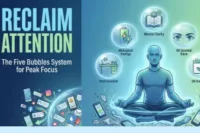How to Balance Side Hustle & Full-Time Job as Introvert
Published: 09/06/2025
If you’re an introvert with a full-time job and a growing side hustle, you’re not alone—and you’re definitely not lazy for feeling exhausted. In fact, nearly 70% of Americans now have a side hustle, and more introverts than ever are joining the movement. Why? Because side gigs offer something most 9–5 jobs don’t: the ability to work independently, quietly, and on your own terms.
But here’s the challenge—balancing two jobs while protecting your mental energy isn’t easy when your personality craves calm, space, and solitude. After a day full of meetings, pings, and people, the last thing many introverts want is more demands. That’s why this guide isn’t just about managing time—it’s about managing energy, mindset, and emotional bandwidth.
In this post, you’ll learn practical, introvert-friendly strategies to:
- Create a schedule that respects your energy flow
- Choose a side hustle that fits your quiet strengths
- Avoid burnout with smart routines and built-in downtime
- Set boundaries at work and home (without guilt)
- Work steadily—not constantly—toward your goals
If you’ve ever wondered whether it’s possible to grow a side gig without losing your evenings, weekends, or sanity, this post is for you.
Let’s build a sustainable, peaceful approach to success—one that fits you, not hustle culture.
The Rise of Side Hustles (and Why Introverts Are Embracing Them)
Let’s be honest—these days, having just one job feels almost old-school. Whether it’s to cover bills, chase a passion, or build something of their own, more people than ever are taking on side hustles. According to recent reports, anywhere from 45% to 70% of U.S. adults now have some kind of side gig. And with remote work becoming the norm, 43% of workers say they’ve gained extra time to spend on side projects thanks to working from home.

This shift isn’t just for the super social or ultra-ambitious. It’s actually great news for introverts.
Why Side Hustles Are a Natural Fit for Introverts
Here’s the thing: most traditional jobs are built around constant interaction—meetings, team check-ins, open-office noise. If you’re an introvert, that can be…a lot. A side hustle, on the other hand, gives you freedom to work in your own zone, often solo and from the comfort of home.
Think about the most common types of side gigs: writing, design, online shops, virtual assistance. These are quiet, focused types of work. You’re not stuck in a group chat all day or making endless calls. You can work in blocks of time when you have the most energy—and in a space that doesn’t drain it.
In fact, research has shown that introverts often thrive in solo tasks, with higher focus and better long-term productivity compared to their extroverted counterparts. It’s not just preference—it’s how their brains are wired.
So when introverts choose the right side hustle, they’re not forcing themselves to fit a mold—they’re actually leaning into what they already do well.
More Than Money: Side Hustles as an Outlet
Of course, side hustles help with income. But for introverts, there’s often another big benefit: personal fulfillment.
If your 9–5 leaves you mentally tired or stuck in a fast-talking office culture, a side hustle can be your creative escape. It’s something that’s yours—on your terms, at your pace. Whether you’re quietly building an Etsy shop or editing videos at night with your headphones in, it can feel like a small pocket of calm in a noisy day.
As one introverted entrepreneur put it: “We often perform better on our own, at our pace.” That’s the real magic of a side hustle—it gives you a space where your introverted strengths can shine, not shrink.
Challenges Introverts Face When Balancing a Full-Time Job and Side Hustle
Balancing two jobs is tough for anyone—but for introverts, it comes with a unique set of hurdles that aren’t always obvious from the outside. While some people seem to thrive on packed schedules and back-to-back interactions, introverts often need space, quiet, and alone time to stay mentally and emotionally well.
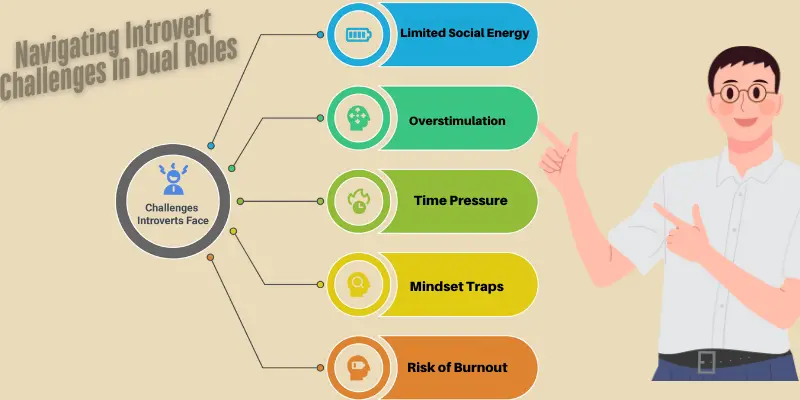
Here are the most common challenges introverts run into when juggling a full-time job and a side hustle—and why it’s important to take them seriously.
1. Limited Social Energy & “People” Exhaustion
You’ve probably heard the term “social battery.” For introverts, that battery drains quickly—especially after a full day of meetings, calls, and small talk. By the time 5 p.m. rolls around, you might feel completely tapped out.
And here’s the catch: starting your side hustle in that state means using the very energy you need to recharge. Over time, that can lead to frustration, loss of motivation, and eventually burnout.
If you often feel like you “just can’t” after work, it’s not laziness—it’s your brain asking for a break.
2. Overstimulation & After-Work Fatigue
Modern workplaces aren’t exactly introvert-friendly. Constant Slack pings, open office noise, surprise Zoom calls—it’s a lot. And by the end of the day, your nervous system might be in overdrive.
So when it’s time to switch gears to your side project, your brain’s just saying, “No more.” That overstimulated feeling can make you want to do… well, nothing. And that’s okay. But if it happens regularly, it can delay progress on your side hustle—or worse, make it feel like another burden instead of something fulfilling.
3. Time Pressure (Plus Guilt)
There are only so many hours in the day—and if you’re working full time, those free hours are precious. For introverts, alone time isn’t optional—it’s how you reset. When you give all of it to your side hustle, it can start to feel like you’re giving up the one thing that keeps you sane.
Then there’s the guilt. Maybe you turn down plans with friends to work on your side hustle. Or maybe you feel bad not working on your hustle because you needed a night to rest. Either way, you end up stuck in a mental loop of “should I be doing more?” That kind of pressure is exhausting all by itself.
4. Mindset Traps and Comparison
Introverts are often thoughtful, deep thinkers—and sometimes that turns into overthinking.
You might compare yourself to people who seem to hustle non-stop on social media. You might hold back from promoting your side hustle because it feels awkward or “too loud.” Or maybe you beat yourself up over a small mistake or slow progress—even when you’re already doing a lot.
These mindset traps can suck the joy out of your side project and make it feel like you’re falling behind, even when you’re not.
5. Real Risk of Burnout
Put all of this together—social exhaustion, overstimulation, time pressure, mental guilt—and you’ve got a recipe for burnout. For introverts, burnout doesn’t always look like a big crash. Sometimes it’s quieter:
- Feeling emotionally numb
- Dreading both your job and your side hustle
- Wanting to unplug from everything
- Or just running on autopilot for weeks at a time
The key is to recognize the signs early and adjust your rhythm before you hit a wall.
These challenges are very real—but they’re not deal-breakers. In the next section, we’ll look at how to choose a side hustle that actually works for your energy and lifestyle (not against it).
Ready for the next part?
Choosing the Right Side Hustle for Your Introvert Lifestyle
If you want your side hustle to work long-term—not just financially, but mentally and emotionally—it needs to fit who you are. And if you’re an introvert, that means choosing something that respects your need for quiet, independence, and solo focus.
Here’s how to pick a side hustle that supports you, not drains you.
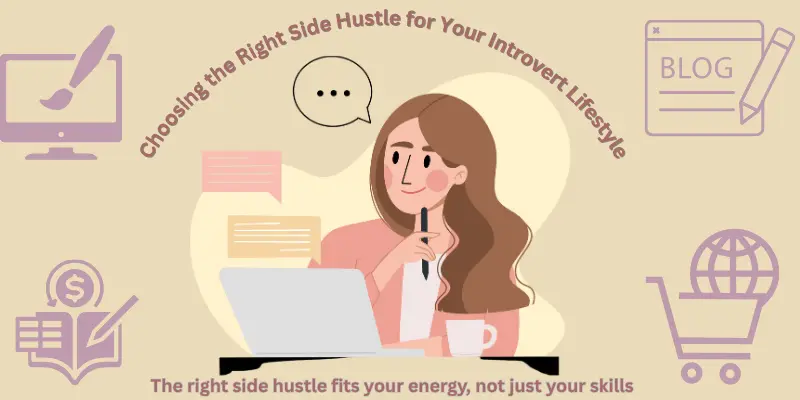
Match Your Energy, Not Just Your Skills
Let’s start with something most people ignore: your energy flow. For introverts, energy isn’t endless—and it comes in waves. So the right side hustle isn’t just about what you’re good at. It’s about when and how you can work without feeling completely wiped out.
Are you more focused in the early mornings before the world wakes up? Or do you come alive at night once things are quiet? Pick a hustle that lets you work in those hours, in manageable chunks. Project-based or creative tasks (writing, designing, coding) work great here, especially if you can do them independently and without interruptions.
Avoid gigs that require you to be “on” all the time—like real-time customer service, sales calls, or anything that needs constant video meetings. Those are energy zappers, especially after a long workday.
Introvert-Approved Side Hustle Ideas
Here are a few options that naturally suit introverts—jobs you can do solo, in a focused setting, and on your own schedule:
- Freelance writing or blogging – Share your ideas and experiences in writing. Most communication happens over email, and you can work quietly at your own pace.
- Graphic design or coding – Highly focused, creative work that rewards deep concentration. You often communicate via brief written instructions, not meetings.
- Virtual assistant or bookkeeping – Structured, behind-the-scenes tasks like scheduling, data entry, or managing inboxes. Perfect for organized minds who like working alone.
- E-commerce (Etsy, dropshipping, print-on-demand) – You create and manage products online, interact with customers digitally, and set your own shop hours.
- Creating online courses, digital downloads, or video content – You batch-create content in your own space, then sell it passively or respond to messages at your convenience.
Each of these taps into the introvert “superpower”: the ability to go deep, work quietly, and stay focused without needing constant feedback or interaction.
Let Your Strengths and Interests Guide You
The best side hustle is one that feels more like you than like work. Think about what people already ask you for help with—writing resumes? Editing their bios? Researching tools or tech? That’s your starting point.
Introverts often bring strengths like:
- Careful observation
- Creativity
- Listening
- Empathy
- Problem-solving
So instead of trying to match some flashy trend, find something that uses those natural talents. If you’re a good listener, you might offer 1:1 coaching or editing services. If you’re detail-oriented, maybe proofreading or productivity consulting. The point is: pick something that feels energizing, not exhausting.
Real-Life Example: Sara’s Quiet Side Hustle Win
Meet Sara. She’s a marketing analyst by day and describes herself as a “quiet worker who thrives behind the scenes.” She also loves writing—but in her day job, she rarely gets the chance to do it creatively.
So she started freelancing on the side as a blog writer. Why did it work? She could:
- Write at night in silence
- Communicate via email, not Zoom
- Choose clients and topics that felt fun
Fast-forward a year, and she’s earning an extra $1,000/month from just a few regular clients. “Writing energizes me,” she says. “And I love that I can do it quietly after work. I set my own pace, which is perfect as an introvert.”
Sara’s story proves a powerful point: when you choose the right kind of hustle—one that works with your energy and personality—it doesn’t feel like more work. It feels like something you actually look forward to.
Ready for the next section?
Time Management & Scheduling Strategies for Introverts
Let’s be real: balancing a full-time job and a side hustle takes planning. But if you’re an introvert, it’s not just about squeezing tasks into your calendar—it’s about protecting your energy while getting things done.
The good news? With the right rhythm, you can create a routine that works with your personality, not against it.
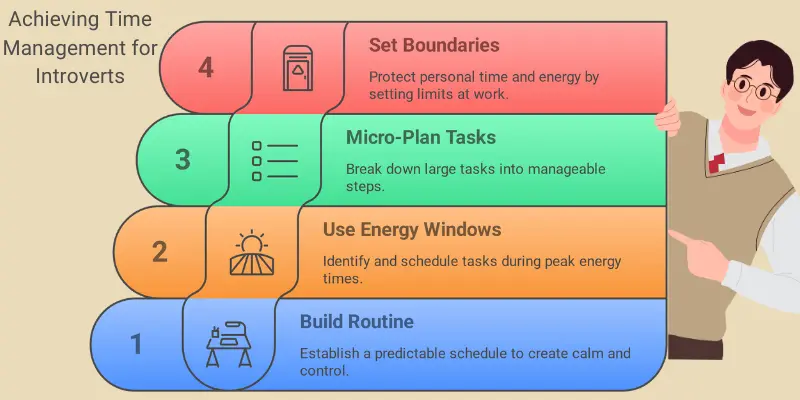
Build a Routine That Feels Safe and Predictable
Most introverts don’t love chaos. A steady, predictable routine brings a sense of calm and control—which is huge when your day is split between work, hustle, and rest.
Here’s what helps:
- Pick consistent time blocks for your side hustle (e.g., 7–9 p.m. on Mondays and Wednesdays, plus one weekend morning).
- Treat those blocks like appointments—but with built-in flexibility. If you’re feeling drained one night, it’s okay to shift that work to a day when you have more in the tank.
- Add breaks into longer sessions—something as simple as a 10-minute walk or tea break can reset your brain and prevent burnout.
Over time, this rhythm becomes second nature. You won’t have to wonder “when should I work on my side hustle?”—you’ll already know.
Use Your Energy Windows Wisely
Not all hours are created equal. Some people feel clear-headed in the early morning; others perk up once the world quiets down at night. Your job is to notice when your brain works best—and schedule accordingly.
Ask yourself:
- When do I feel the most focused or creative?
- What time of day do I usually hit a slump?
- After work, do I need downtime first—or can I jump right into hustle mode?
For example, if you’re a morning person, consider waking up an hour earlier twice a week for focused side work. If you need to decompress after your 9–5, plan your hustle hours for later in the evening after a break. You’ll get more done in less time by working with your natural energy—not fighting it.
Make Micro-Plans, Not Mega Lists
Big plans sound great—until they become overwhelming. That’s where micro-planning comes in.
Start each day (or the night before) with a short to-do list. Keep it simple:
- Limit it to 2–3 important tasks total
- Break each task into smaller steps
- Estimate how much time each one needs
Instead of writing “Build website,” try:
- Buy domain name (10 min)
- Sketch homepage layout (20 min)
- Write first draft of About page (30 min)
Small, clear tasks feel manageable—even on days when your energy’s low. And crossing them off gives you that “I’m actually making progress” feeling.
Bonus: whether you use an app, sticky notes, or a bullet journal, just pick a method you’ll actually stick with. The tool doesn’t matter. The habit does.
Set (Gentle) Boundaries at Your Day Job
Here’s a hard truth: if your 9–5 consumes all your energy, your side hustle won’t get the time it needs. That’s why boundaries matter—even the small ones.
Try things like:
- Not volunteering for every “fun” team project
- Saying “not right now” to extra tasks when your plate’s full
- Using your break times to recharge instead of chatting or scrolling
- Leaving work on time instead of staying late out of habit
If you’re in a role with flexible hours, you could even ask about starting earlier to free up evenings. But only if it doesn’t add stress to your main job.
The goal isn’t to do less at work—it’s to be smart with your time and energy so your off-hours don’t vanish into work leftovers. Those hours are yours. You need them for your goals, your rest, and your sanity.
Energy Management and Self-Care for Introverts
You’ve probably heard the phrase, “You can’t pour from an empty cup.” For introverts balancing a full-time job and a side hustle, that’s not just a saying—it’s a strategy. Your energy is your most valuable resource, and how you manage it can make or break your balance.
Let’s talk about how to protect your energy without guilt, burnout, or shutting down.
Protect Your “Social Battery” at Work
Think of your energy like a phone battery. If you spend all day at 100% brightness with a bunch of apps running (aka meetings, Slack messages, hallway chats), by 5 p.m., you’re running on fumes.
So here’s the move: budget your energy like you budget your time.
Some simple ways to do that:
- Stack meetings on certain days so you’re not “on” every single afternoon
- Take solo lunch breaks—eat outside, go for a walk, or just sit quietly with a podcast or audiobook
- Block off quiet time on your work calendar (if you can), even just 30 minutes a day for solo tasks
- Skip the small talk when you need to—seriously, it’s okay
It’s not rude or antisocial—it’s just smart energy management. The more you protect your headspace during work, the more you’ll have left for your side hustle later.
Schedule Downtime Like You Schedule Tasks
This one’s big: Rest isn’t optional—it’s part of the plan.
When you’re juggling two roles, it’s easy to treat every spare minute as a work opportunity. But that’s a fast track to burnout, especially for introverts who need quiet time to reset.
Here’s a better way:
- Block out time for nothing—yes, literally nothing
- Give yourself at least an hour after work to decompress (e.g., dinner, a walk, or a long shower)
- Set aside one weekend block for low-key rest: no hustle, no chores, just something calming
Whether that’s reading, gaming, gardening, or laying on the couch with your cat—if it recharges you, it counts.
Protecting that space helps you come back to your side hustle with focus and creativity, instead of dragging yourself through it.
Create Your Own Quiet Productivity Zone
You don’t need a fancy office to get into a productive mindset—but you do need a space that feels calm and yours.
Your “quiet zone” can be:
- A corner of your room with soft lighting and noise-cancelling headphones
- A small desk with minimal clutter, maybe a plant or candle for good vibes
- A designated table where people know, “If I’m here, I’m in focus mode”
Even a set playlist (like soft piano or rain sounds) can trigger a sense of calm focus. Little cues like these train your brain: this is your creative, introvert-friendly zone.
And make sure the people around you know too. A simple heads-up like, “Hey, I’m working for the next hour—just need some quiet,” goes a long way.
Tune In to Your Energy Signals (and Don’t Ignore Them)
You know that feeling when your brain feels foggy, everything feels “too much,” and even answering a text feels like a chore? That’s not you being lazy—it’s your body saying, “I’m done.”
Introvert burnout isn’t always loud—it often shows up as:
- A strong urge to cancel all plans
- A sense of dread about even your favorite side hustle task
- Snapping at small things because you’re overwhelmed
The fix? Pay attention and adjust. If you’re in a high-stress week at work, it’s okay to hit pause on your hustle for a couple days. If you’re feeling emotionally heavy, trade 60 minutes of work for 20 minutes of journaling or a solo walk.
Think of energy management like balancing a budget. Some days are high-spend days. The trick is knowing when to pull back and refill the tank before you hit zero.
Productivity Tips Tailored to Introverts
You don’t need to hustle like an extrovert to be productive. In fact, introverts often thrive when they stop trying to match someone else’s pace and start working in ways that actually suit their brains.
Here are a few smart strategies to help you get more done—without burning out.
Use Deep Work to Your Advantage
One of the biggest introvert strengths? The ability to focus deeply and work solo for long stretches.
This is gold for side hustles.
Here’s how to make it work for you:
- Block out quiet, uninterrupted time (aim for 60–90 minutes)
- Turn off notifications (or put your phone in another room)
- Let family or roommates know you’ll be in “heads-down” mode for a bit
This kind of deep work is where you’ll make real progress—writing content, building a product, finishing a client project. No multitasking. No bouncing between apps.
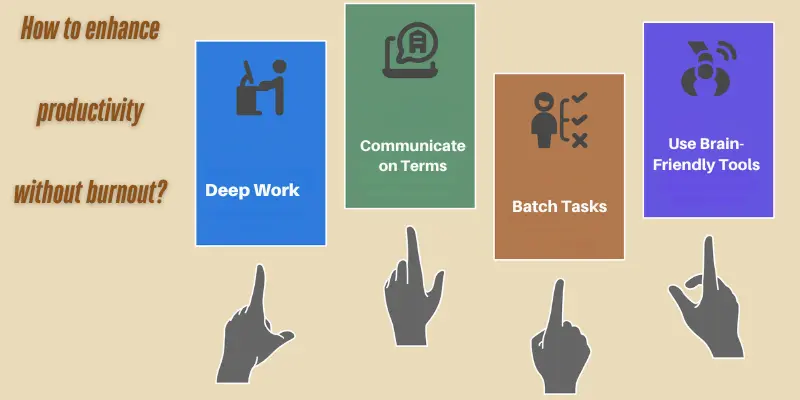
Studies even show that introverts’ brains are highly active during solo thinking, which means when you’re focused, you’re not just working—you’re thinking deeply, solving problems, and doing your best work.
Just two or three deep work sessions a week can seriously move the needle.
Communicate on Your Terms (Thanks, Tech)
If your side hustle involves other people—clients, collaborators, or customers—don’t feel pressured to always be “on call.” Instead, set up tools and workflows that let you communicate when you’re ready.
Here’s what helps:
- Use project tools like Trello, Asana, or Notion to keep track of tasks
- Stick to email or messaging apps with async replies
- When meetings are needed, suggest a quick voice memo or screen recording instead of live calls
Platforms like Upwork or Fiverr are also introvert-friendly because most of the interaction is written and on your own schedule.
The goal? Preserve your energy and respond when you’re focused, not frazzled. That’s better for everyone.
Batch Your Tasks to Stay in the Zone
Ever feel exhausted switching between tasks all day? That’s called context switching, and for introverts, it can be especially draining.
Try this instead:
- Batch similar tasks together—like writing, editing, or admin
- Reserve one evening for creative work, another for emails or invoicing
- If your workday is socially heavy, keep your side hustle work that evening low-stimulus (e.g., research, planning)
Staying in one mental mode longer helps you go deeper, stay calmer, and avoid that scattered, worn-out feeling.
Use Tools That Work With (Not Against) Your Brain
You don’t need a million productivity apps. But the right ones can make a real difference—especially if they match how your brain works.
Here are a few introvert-friendly ideas:
- Pomodoro timers (25 min focus / 5 min break) to prevent overwork
- Ambient noise apps (rain, forest, coffee shop) to make solo work feel less isolating
- Journaling or planning apps to clear mental clutter (especially useful for overthinkers)
- Or… just a good old notebook with a short to-do list
You don’t need complicated systems—just something that keeps you organized and calm. If a tool adds stress, it’s not the right one.
Mindset Shifts for Sustainable Success
Balancing a full-time job and a side hustle isn’t just about schedules and task lists—it’s also about how you think. And for introverts, having the right mindset can make the difference between quiet progress and quiet burnout.
Here are four mental shifts that can help you keep going, without losing yourself in the process.
Redefine “Hustle” in a Way That Works for You
You don’t have to “rise and grind” at 5 a.m. every day to be successful. That idea—that hustle has to be loud, fast, and constant—is built for a different kind of person.
For introverts, hustling quietly and sustainably often works better.
You’re allowed to grow slowly.
You’re allowed to rest.
You’re allowed to say, “This pace works for me.”
In fact, doing less—but doing it with focus and intention—often leads to better results than pushing yourself nonstop. Treat your side hustle like a long hike, not a sprint. It’s not about how fast you get there—it’s about not running out of breath halfway through.
Let Go of Perfectionism and Self-Doubt
Overthinking is practically an introvert hobby. We second-guess. We wait for the “right time.” We rewrite the same sentence five times.
But here’s the truth: you don’t need to be perfect to make progress.
If you’ve been putting off launching your website, pitching a client, or posting your first product, ask yourself:
“What’s the worst that could actually happen?”
Chances are, it’s not nearly as scary as your brain makes it feel.
Focus on small wins. Celebrate firsts—your first draft, your first sale, your first happy email. Every “imperfect” step teaches you something and builds confidence. Over time, you’ll realize that forward is better than flawless.
Learn to Say “No” Without Guilt
When you’re juggling a full-time job, a side hustle, and a personal life, saying yes to everything just isn’t an option.
That’s where “no” becomes your best friend.
It’s okay to:
- Turn down non-essential work tasks
- Skip social events when you’re drained
- Postpone side hustle work if you’re running on empty
Every time you say no to something that doesn’t serve you, you’re saying yes to your well-being, your priorities, and your ability to show up fully for what does matter.
Rest is productive. Boundaries are powerful. And every successful person—introvert or not—protects their time like it’s gold.
Own Your Introvert Strengths
We live in a world that often values loud voices and quick responses. But don’t let that fool you—your quiet strengths are just as powerful.
Introverts bring:
- Thoughtfulness
- Deep focus
- Creativity
- Empathy
- Strong listening skills
These aren’t “nice-to-haves.” They’re advantages—especially in side hustles that involve writing, design, teaching, strategy, or solo creative work.
You don’t need to be the loudest in the room to make an impact. You just need to be clear on who you are and how you work best.
As author Holley Gerth said, “Thinking is a legitimate activity, especially for introverts.” Your reflective nature isn’t a weakness—it’s your secret weapon. Use it to solve problems, plan wisely, and build something meaningful—quietly, steadily, and in your own way.
Real-World Examples & Tips from Introverts Who’ve Done It
Sometimes the best advice doesn’t come from experts—it comes from people quietly doing the work, their own way. These stories show that you don’t need to grind 24/7 or be the loudest voice in the room to build something meaningful. You just need a rhythm that works for you.
“Quiet Quitting” the Hustle Culture – Leo’s Story
Leo is a full-time software engineer who tried to launch a startup in his off-hours. Like a lot of introverts in tech, he hit a wall—fast.
He was burned out. Tired. Creatively stuck.
His turning point? Realizing he didn’t need to match the Silicon Valley hustle narrative. So he stopped chasing “grow fast” culture and adopted a calmer approach:
- Modest weekly goals
- One week off every two months
- No pressure to push through exhaustion
A year later, Leo’s side project had made slow but solid progress. More importantly, he felt energized, not drained. “Go at your own pace,” he says. “Consistency beats intensity—especially for us introverts.”
Batching & Boundaries – Priya’s Etsy Routine
Priya works full-time as an accountant and runs a growing Etsy shop on the side. The key to her sanity? Boundaries.
She works on her shop just three nights a week: Tuesday, Thursday, and Sunday from 7 to 10 p.m. The other nights? Reserved for rest—or what she calls her “introvert spa nights.” (Which often means tea, a book, and not talking to anyone.)
She also let friends and coworkers know:
- Evenings are Etsy time (she’ll reply to emails later)
- Mondays and Fridays are off-limits for extra work or social plans
“It stopped the work-from-home blur for me,” Priya says. Her part-time business grew steadily without overwhelming her. Why? Because she knew when to hustle—and when to stop.
Turning a Quiet Strength into a Business – Marisol’s Coaching Side Hustle
Marisol has always preferred listening over talking. For years, she thought that made her “too quiet” to teach or coach. But she was wrong.
She turned that quiet strength into a superpower—and launched a part-time tutoring and coaching business online.
Her approach?
- Offers 1:1 sessions in a calm, low-pressure setting
- Advertises her patient, thoughtful style—which many introverted students love
- Works with just three clients on Saturday mornings, when she feels most refreshed
Now, her soft-spoken nature is her selling point. “I used to worry I was too quiet to coach,” Marisol says. “But now I know my reflective nature is exactly why some clients choose me.”
What These Stories Have in Common
Each of these introverts found a setup that fit their life and energy—not someone else’s expectations.
The shared takeaways:
- They respected their boundaries
- They made space for rest
- They played to their natural strengths
- They didn’t rush
There’s no perfect formula for balancing your job and side hustle—but there is a right formula for you. Start with what feels sustainable, be honest about what drains you, and keep showing up—quietly and consistently.
Conclusion: Quiet Hustle, Real Success — Finding Your Balance as an Introvert
If you’ve made it this far, here’s the truth: you already have what it takes to balance both roles—you just need a system that fits you.
You don’t need to hustle harder. You need to hustle smarter, quieter, and in your own rhythm. That means:
- Choosing a side hustle that aligns with your energy
- Creating structure without sacrificing rest
- Setting boundaries at work and at home
- Letting go of perfection and trusting your pace
This isn’t about squeezing productivity into every moment. It’s about building a work-life blend that leaves you energized—not empty.
Quick Recap:
- Use your introvert strengths to your advantage—deep work, empathy, focus
- Respect your energy limits and schedule in rest just like you schedule tasks
- Say no when needed, and give yourself credit for progress, not perfection
- Let your hustle grow at your pace, not someone else’s timeline
You’re Allowed to Do This Differently
There’s no rule that says success has to be loud or fast. You can grow slow, work quietly, and still build something meaningful. Plenty of introverts are doing it—and you can too.
So if you’ve ever doubted whether it’s possible to balance a full-time job and a side hustle as an introvert, let this be your reminder:
💬 Success doesn’t always shout. Sometimes, it whispers… then shows up in your bank account, your calendar, and your peace of mind.
Here’s to your quiet hustle, your clear boundaries, and your version of success—on your own terms.
What’s Your Quiet Hustle?
If you’re balancing a full-time job and a side gig—or thinking about starting—I’d love to hear how you’re making it work.
Drop a comment and share your biggest challenge or your favorite introvert-friendly tip.
Let’s build a calm, creative space for introverts to grow, learn, and quietly thrive—together.
Answers to Your Burning Questions About Juggling Work and a Side Hustle
Motivation often comes from energy, not willpower. Introverts should prioritize rest before hustle. Try working during your peak energy hours (like early morning or late evening) and start small—15–30 minutes of focused work can go a long way. Also, reconnect with your “why”—financial freedom, creative fulfillment, or personal growth.
Avoiding burnout starts with:
- Scheduling downtime like you schedule work
- Setting boundaries at your day job
- Picking a side hustle that recharges you instead of drains you
- Being okay with slow, steady progress—introvert style
Burnout happens when you ignore your need to recharge. Make rest non-negotiable.
Use introvert-friendly tools and techniques:
- The Pomodoro Technique (25/5 focus cycles)
- Batch similar tasks to avoid context-switching
- Work in distraction-free blocks of 60–90 minutes
- Use task lists with small, manageable steps
Also, don’t try to do everything at once—choose one or two high-priority tasks per day.
It depends. If your side hustle doesn’t conflict with your job, and you’re working on it outside of company hours, many people keep it private. If you’re in a position where it could raise concerns, check your employment contract or speak with HR discreetly.
Start by playing to your strengths—focus, creativity, empathy, and deep thinking. Avoid comparison and perfectionism. Celebrate small wins, take intentional breaks, and remind yourself: success doesn’t have to be loud. Quiet consistency builds real confidence.
Start by auditing how you currently spend your time—track it for a few days. Then block out a few small windows each week for side hustle work (even just 1–2 hours). Protect your rest time too. The key is intention over intensity—small, focused efforts add up.
Skip the “networking events” if they drain you. Instead, introverts often succeed with:
- Writing helpful blog or social media content
- Building genuine one-on-one relationships online
- Asking for referrals via email or DMs
- Letting your work speak for itself
Self-promotion doesn’t have to be loud—it can be honest, helpful, and human.
It depends on your personality and goals. If monetizing adds stress, keep your hobby just for fun. But if it feels exciting and energizing, go for it. Just be honest with yourself—not all passions need to become income streams. And that’s okay.
That’s normal. Motivation comes and goes—especially when you’re already working a day job. Try revisiting your “why,” adjusting your goals, or taking a short rest break to reset. Remember: discipline and rest work together. Don’t expect to feel motivated every day—just aim to show up when it matters.
Absolutely. Some of the most successful entrepreneurs are introverts—like Bill Gates and Elon Musk. You don’t need to be charismatic or extroverted to build a business. You just need to know your strengths and design your systems around them.

- Be Respectful
- Stay Relevant
- Stay Positive
- True Feedback
- Encourage Discussion
- Avoid Spamming
- No Fake News
- Don't Copy-Paste
- No Personal Attacks

- Be Respectful
- Stay Relevant
- Stay Positive
- True Feedback
- Encourage Discussion
- Avoid Spamming
- No Fake News
- Don't Copy-Paste
- No Personal Attacks


